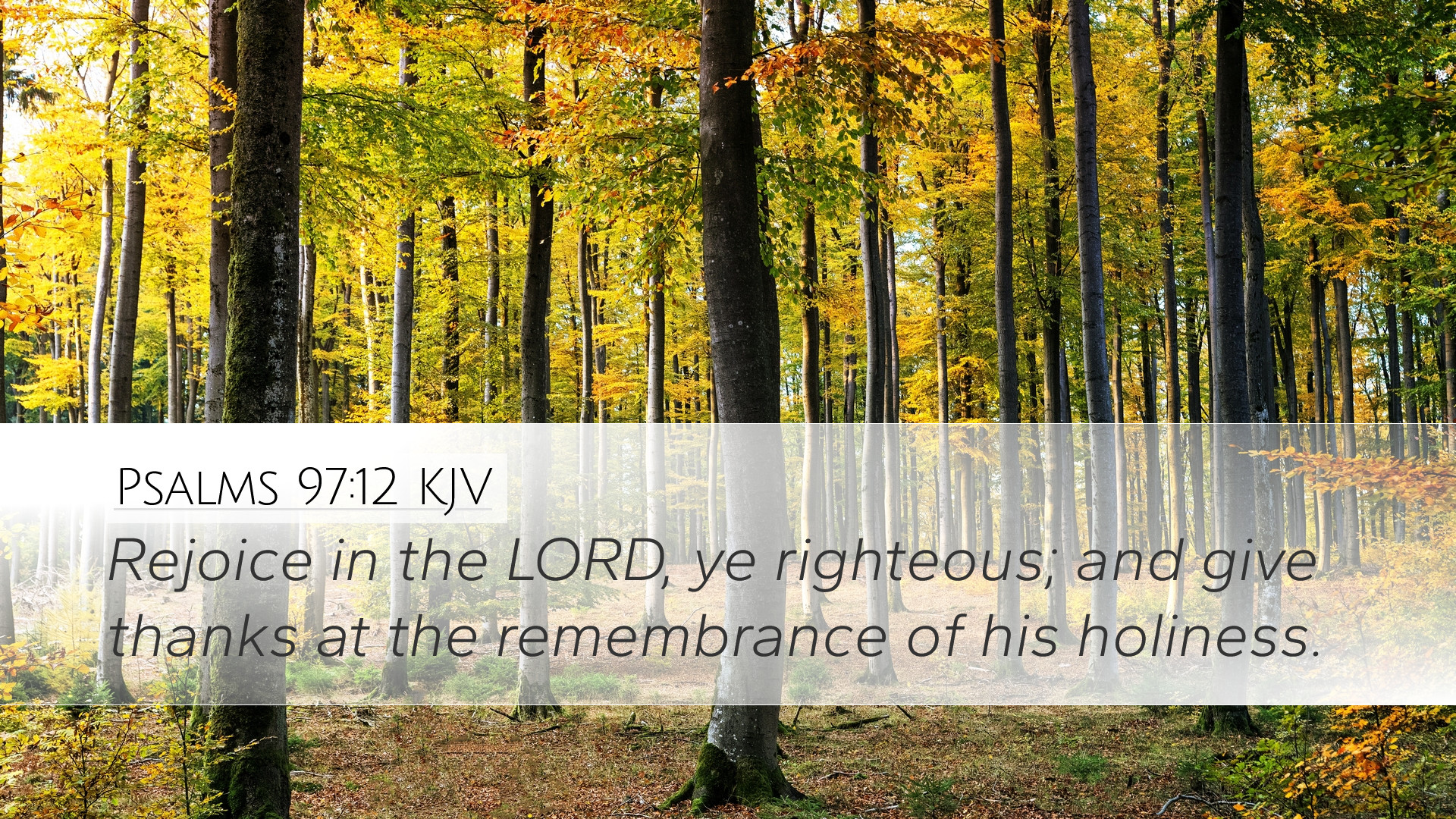Commentary on Psalms 97:12
Verse Text: "Rejoice in the LORD, ye righteous; and give thanks at the remembrance of his holiness." (Psalm 97:12)
Introduction
The verse encapsulates a call to joy and gratitude towards God by those who are considered righteous. The psalmist, under the inspiration of the Holy Spirit, emphasizes the imperative for the faithful to rejoice in the character of God, especially His holiness. This commentary seeks to explore the depths of the text by synthesizing insights from notable public domain commentaries.
Contextual Background
The 97th Psalm belongs to a series of enthronement psalms that celebrate the reign of God. It acknowledges His sovereignty over all creation, depicting the reactions of nature and nations to His majesty. The overarching theme is the righteousness of God, which justifies the call for rejoicing and gratitude from His people.
Detailed Analysis
The Command to Rejoice
Matthew Henry emphasizes that the command to rejoice is not merely an emotional response but a deliberate act of will. Righteousness is the foundation upon which true joy is built. Therefore, the call to rejoice is extended specifically to the 'righteous,' those who align themselves with God’s ways and His justice.
Albert Barnes illustrates that this joy reflects an internal state of being that should pervade the lives of believers. By focusing on God's holiness and righteousness, the faithful find reasons for celebration that surpass their immediate circumstances.
Righteousness and Its Implications
Within the text, the term 'righteous' signifies those who live according to God’s statutes. Adam Clarke notes that righteousness not only involves moral purity but also a continual striving towards God’s standards, resulting in joy that is rooted in faith and obedience.
- Clarke's interpretation suggests that true righteousness leads to greater awareness of God's character.
- This awareness, in turn, ignites a deeper joy, compelling believers to express their gratitude.
The Call for Thankfulness
Not only are the righteous called to rejoice, but they are also invited to give thanks, particularly 'at the remembrance of his holiness.' Here, we see a dual action: rejoicing in the heart and expressing gratitude through words and actions.
Henry underscores that the holiness of God is a perfect quality that stands in stark contrast to human sinfulness. As such, remembering His holiness encourages believers to reflect on their own state and fosters a sense of awe and respect for God.
The act of giving thanks becomes a vital response that affirms God's character as both holy and benevolent. Barnes further expresses that gratitude should hearken back to the various manifestations of God's holiness in the life of the believer, thus encouraging continual remembrance of God's magnificent deeds.
Theological Implications
This verse presents profound theological implications regarding the nature of God and humans' response to Him. The righteous are portrayed as those who recognize their standing before a holy God and respond appropriately.
- God’s Holiness: It is crucial to understand that God’s holiness is not just an abstract concept but a practical attribute that informs His justice, mercy, and love.
- Human Response: The declaration to “rejoice” and “give thanks” shapes the believer's relationship with God, moving from mere acknowledgment to active engagement in worship.
The Connection Between Righteousness and Joy
There exists a direct connection between a believer's righteousness and their capacity for joy. Henry elucidates that true joy is not a fleeting happiness based on external circumstances but a stable, profound satisfaction found in a relationship with God. Thus, when the righteous acknowledge their position in Him, joy naturally ensues.
Conclusion
Psalms 97:12 serves as an exhortation for believers to rejoice and give thanks, grounded in their understanding of God’s holiness and righteousness. The insights from Matthew Henry, Albert Barnes, and Adam Clarke converge on the understanding that joy is a distinguishing mark of the righteous conditioned by their relationship with God.
In summary, the verse affirms that as believers remember the holiness of God, their response should be one of sincere rejoicing and profound gratitude—a reflection of their alignment with divine righteousness. This call is not only a personal challenge but also an invitation to communal worship and gratitude among the faithful.


